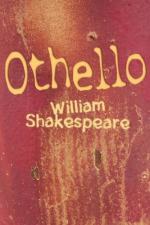|
This section contains 994 words (approx. 4 pages at 300 words per page) |

|
Shakespeare's "othello" and Aristotle's Notion of Tragedy
Summary: This essay shows how Shakespeare's "Othello" conforms to Aristotle's notion of tragedy.
Aristotle's notion of tragedy states, "a tragedy is a form of drama exciting the emotions of pity and fear. Its actions should be single and complete, presenting a reversal of fortune, involving persons renowned and of superior attainment, and it should be written in poetry embellished with every kind of artistic expression." Apart from this definition of a tragedy that Aristotle had, he also identified six basic elements of tragedy: plot, character, diction, thought, spectacle and song. In Shakespeare's Othello, Aristotle's notion of tragedy is apparent through the concepts of plot, character, diction and thought.
Aristotle believed that a tragedy was not a tragedy if there was no action present. He believed that the plot had to be an imitation of action, and it also had to be a complex plot, with recognition (anagnorisis) and a reversal of roles. Othello fits in with this concept, because it has...
|
This section contains 994 words (approx. 4 pages at 300 words per page) |

|


